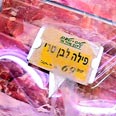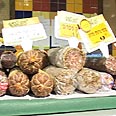

Tel Avivians were in an uproar several weeks ago when Ynet broke a story that deemed to threaten the very pillar of their urban existence. Mini-market super chain AM:PM, a staple of chic secular city life, has decided to remove any and all non-kosher products from their shelves, focusing particularly on shellfish and meats manufactured by the Mizra Deli.
The enormous (and growing) market for non-kosher food is priced at more than NIS 39 billion (about USD 9.22 billion), with about two thirds of the demand being met by the restaurant industry alone and the rest being catered to by thousands of retail shops, delis and private distributors – all of whom would be more than happy to serve you and yours with the very best non-kosher poultry and red meat, Israeli-grown pork, rabbits, ostrich, shellfish.
The driving force being the relatively newly found market is mostly attributed to the mass immigration from Russia, who in turn exposed native Israelis to more and more non-kosher products which were sold increasingly by private retail chains and delis.
"There's no question that this is a developing market that has incredible potential," said Duby Shnaidman, CEO of Tiv Taam. "Today only 7 percent of the Israeli population consumes non-Kosher products. 50 percent of Israelis are determined secular, and they are the potential clients of this branch."
Consumers from all religions
The majority of non-kosher consumers are Jews who do not keep Kosher, immigrants from Eastern Europe and the Arab sector – which is divided between Arab Christians who eat pork and Arab Muslims who do not eat pork but do eat non-Kosher poultry.
"The social norms of the past have been broken, and that is evident on the culinary level too," says Shnaidman, "Whereas in the past there were entirely kosher family meals, today the situation has changed. There are a lot more single-parent families, a lot less family meals, you don't buy in bulk and store it away, you buy smaller amounts and more and more people chose to eat non-kosher food. Our culture and our habits as consumers have changed a lot over the past 15 years."
Some 80 percent of the Mania Deli chain are of Eastern European heritage, while the rest are Israelis who do not maintain kosher diets, but Yaakov Mania, the owner and founder of Maadanei Mania, says that the two groups are different in their shopping habits, with Israelis mostly shopping for specific meat and meat byproducts and are far less likely than their Eastern Europeans counterparts to shop on a whim.
"We had a dream to change the Israeli's culture," explains Mania, "but this proved to be very difficult. For instance Russians see sausage as part of culinary tradition. Israelis perceive the product as unhealthy, and mainly use it in sandwiches for school."
"Israelis receive guests with dried fruit and cakes, the Eastern Europeans do the same with vodka and sausage.
Aiming for the well-to-do
But those shopping at non-kosher chains are not necessarily simply looking for rabbit meat, but also for imported brands. According to Mania, while the Russian immigrants have indeed taken to some of the local brands, like Ossem's Ketchup and Telma's mayonnaise, they are still seeking foods original to their home countries.
Tiv Taam has adopted a new strategy as of late, deciding to branch out and compete against the generic chains. The company has announced its intentions to open a massive new branch at the site of the exclusive YOO Tel Aviv residential project designed by Philippe Starck.
The store will target the country's top percentiles, seen as customers who are frequently aboard and exposed to foreign brands, often bringing home wines and cheese to Israel.
Mania may never change single-handedly change Israel's culture, but certainly many of us are far more prepared to try things that we would once never let near our kitchen















